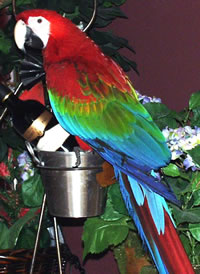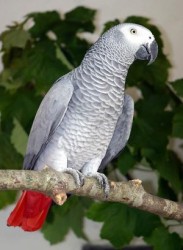GC and I went to our first meeting of the Parrot Society on Sunday night. It was at the Jack Purcell Community Centre. We didn’t know what to expect, but we were pleasantly surprised to see that there were almost as many parrots as people there. There were a bunch of people sitting in a semi-circle with parrots on their shoulders. All kinds of parrots. There was a Macaw, a cockatoo, a quaker, a pionus, an African Grey, a conure, and several others.
Surprisingly, the birds were exceptionally well-behaved. They didn’t fly willy-nilly all over the room, and they didn’t monopolize the conversation. They mostly just sat politely on their people’s shoulders and watched.
 Except for Rock, the Macaw, who stretched his magnificent wings out and chewed on his person’s shoelaces. And Coco, the African Grey, who nuzzled up against her friend’s ear and insisted on being stroked and scratched the entire time, and made noises like water dripping into a full sink. And Lester, the cockatoo, who kept stretching his head up and down while saying “Up and down, up and down.”
Except for Rock, the Macaw, who stretched his magnificent wings out and chewed on his person’s shoelaces. And Coco, the African Grey, who nuzzled up against her friend’s ear and insisted on being stroked and scratched the entire time, and made noises like water dripping into a full sink. And Lester, the cockatoo, who kept stretching his head up and down while saying “Up and down, up and down.”
There’s just something about a talking bird that I find irresistible.
Someone once told me that when she was a kid her father won a mynah bird. They would put a bowl of water in the bottom of its cage and it would jump into the water and splash around and scream “Help! Help!” I think that’s hilarious.
My son and I visited a greenhouse out near Arnprior when he was a kid, and a crow flew across the yard, landed at my son’s feet, looked up at him in a cock-eyed sort of way, and said “Now what? What now?”
A couple of men at Sunday night’s meeting talked about their African Greys. One man said that if he wants to talk to his wife, he has to go find her, because she will no longer come when called. That’s because the bird has called her – in the husband’s voice – too many times, and she won’t fall for it anymore. He also said that whenever the phone rings, the bird says “Hello? Oh hi. Really? Uh-huh. Uh-huh. Yeah. Okay then. Talk to you later. Bye.” This bird also does a very convincing imitation of their doorbell, and they often answer the door to find nobody there. The other African Grey gives commands to the dog, and the dog listens and obeys.
Part of what’s so amazing about talking birds is that they don’t just repeat words. They often understand what they’re saying, and they can mimic specific voices and sounds perfectly. I’ve heard that you have to be very careful about what sounds you expose an African Grey to. Unless you want a bird that mimics your farts, you should leave the room when you need to pass gas. (Personally, I have the sense of humour of a five-year-old, so I’d stay put.) But I wouldn’t want him learning how to mimic the smoke detector, or even the lovebirds for that matter.
 I think I might get an African Grey instead of an eclectus. I met a breeder at the meeting, and she has a one-year waiting list for African Greys. They seem like lovely birds, very intelligent and a lot of fun. Apparently they can achieve the intelligence of a five-year-old, and the emotional maturity of a two-year-old. They live for about sixty years, so I’ll have to make provisions for it after my death. My son says he’ll take it, but only if it swears and farts.
I think I might get an African Grey instead of an eclectus. I met a breeder at the meeting, and she has a one-year waiting list for African Greys. They seem like lovely birds, very intelligent and a lot of fun. Apparently they can achieve the intelligence of a five-year-old, and the emotional maturity of a two-year-old. They live for about sixty years, so I’ll have to make provisions for it after my death. My son says he’ll take it, but only if it swears and farts.
















I’m also fascinated by talking birds. I loved those stories you shared.
One of these days, I’d love to study some bird recordings. I am a phonetician, and work a lot with soundfiles of humans speaking. Birds have, of course, a completely different vocal apparatus, but somehow manage to imitate a wide range of human sounds (as well as non-human sounds, apparently). I’m itching to see what a spectrogram of bird speech looks like! (But not today. That would be procrastinating.)
Oh dear, I suddenly want a foul-mouthed parrot. Unfortunately, it would just end up mimicking cat sounds around here! LOL
There must be a parrot rescue organization, where you can get older birds?
Please, please research the downside to owning parrots ESPECIALLY African Greys. Do check rescue organizations. I know that A.G.s can be especially challenging and due to their lifespan, even if you can handle your “problem” bird, you eventually pass that problem to someone else. Ultimately, just not fair to the bird.
Talking (or even just trick-traininable) birds are a lot of fun. They are just so smart. However I really highly do NOT recommend greys or cockatoos. Probably because of their intelligence, a high proportion of them become feather pickers and self-mutilators despite ALL laborious (and expensive) efforts to make their environments stimulating. Some birds are just not really meant to be in captivity IMO.
On the other hand, I’ve never seen an Amazon featherpicker, and they are great talkers, though the timbre of their voice is not as accurate as greys’ .
You might want to talk to a specialized bird vet like Dr. Roscoe at Lynnwood Animal Clinic to get an idea of how different types of birds tend to do over the long term (and incidentally, to find out what your vet bills might be like. It can be a shock). It’s such a long term decision… you can have lots of time to regret it. I know this from experience, and from seeing other birds like the ones at 2nd chance aviary in Ontario and parrotadoptontario dot com:
http://www.2ndchanceaviary.freeservers.com/photo.html
http://www.parrotadoptontario.com/2009/10/28/news/parrot-adopt-southern-ontario-and-2nd-chance-aviary-working-hand-in-hand/
Those two places adopt out birds, btw.
Hope that does not sound preachy — it is not meant to be. But I have cried many tears over a now 20+ year old bird that won’t stop hurting herself no matter what we’ve tried. And we’ve got another 40 or more years to go…
Sorry, I can’t help but laugh and read the first line as “Dead Parrots Society” (a hopefully obvious portmanteau).
– RG>
African Greys are definitely intelligent – sometimes too intelligent I think. Dave’s aunt has one and he sits there hunched over like a vulture, just waiting for an unsuspecting victim to go by. He also calls her son Cole, in the most evil voice I’ve ever heard. But he does make farting noises too – and rings the door bell, the phone (which the other bird answers “hello”)
Oh yeah, I’d recommend trying to find an older African Grey, and not jump at a baby. They can live so long, you really have to think differently about them.
On the other hand, I’ve had Harley (re-homed) for a few years now, and he’s just a joy. I haven’t updated my blog in ages, but you can get some ideas there. Just ask if you have any questions.
We have a friend that had a bird rescue in Old Chelsea. He may still run it, will have to check. He is a real fan (understatement) of animals. Judges dog shows and raised various different types of dogs. In more recent years his passion turned to birds and the last we heard he had about 7 or 8.
What great follow up information you are getting here.
Alejna, oh, yes, it would be fascinating to study parrots from a linguist’s or a phonetician’s perspective. Parrots don’t even have vocal cords, so I’m not sure which anatomical structure does the vocalizing. I find mimicry in general fascinating – I know a few people who can easily adopt accents. GC can do a perfect imitation of Ernie from Sesame Street.
Arden, that’s the thing – I’m afraid a parrot would just learn how to mimic lovebirds here. Mimic and amplify. Yikes.
Julia, there are parrot rescues – I haven’t found any in Ottawa, but I regularly visit some other Ontario ones online. They tend to have more cockatoos and problem birds than anything else. I also watch Kijiji and UsedOttawa obsessively for second-hand birds. I would consider adopting one (in fact Billie and Lester came from the Humane Society) but it would have to be a pretty well-adjusted bird. One that was well loved and well taken care of in its previous life. It’s easy to permanently damage a bird through neglect in its early years, and I want one that has gotten off to a good start in life. (Preferably a hand-fed, well-socialized young bird.)
Nancy, I appreciate your concern and want you to know I’ve been doing lots of research. I’ve read a couple of books by Mattie Sue, and I’m reading Parrots and People now. I visit lots of avian websites, subscribe to Bird Talk, and I’ve been obsessively researching electus. (And now that I’m thinking about an African Grey instead of an Eclectus, I will do tons of research about AGs.) I know people very often give up parrots after a year or two or three, saying if they’d known what they were getting into, they wouldn’t have gotten a parrot in the first place. I don’t want to be one of those people. (I ended up abandoning my dream of getting a salt water aquarium after doing the research – and it might happen with a parrot too. I hope not, but time will tell.)
Daphne, thank you for your input. That’s an excellent idea about talking to Dr. Roscoe. I’d already decided she will be my avian vet, but I hadn’t thought about consulting with her *before* getting a parrot. I’m going to do that!
Grouchy, ha! I like your eye.
Valerie, he sounds like an interesting bird. Does he pluck his feathers?
Pamela, thank you, I’ll go take another peek at Harley. (I’d adopt an older bird if he was in good health and feather – I’m just afraid of adopting someone else’s problem bird.)
Techwood, he didn’t have huskies did he?
Deb, yes, it’s one of the great benefits of blogging. I have access to so many people who know so much about so many things.
I have honestly never wanted a pet before until you started writing about birds…
I am more emphatic than ever, however, about not wanting a rodent. 😉
Finola, good choice. Birds can be surprisingly endearing pets. Rats, not so much.
My parrot is a feather plucker though he doesn’t make himself completely bald. He pulls out all his red body feathers which leaves him looking like a little ball of grey fluff with an enormous red head. Unfortunately he pulls his long blue tail feathers out too. This goes on for months at a time then he suddenly lets them all grow in again.
He was found on the road years ago with a broken wing which probably explains the neuroticism. Apart from the feather plucking he’s adorable though he does like to BITE my ears rather hard.
You’re right, Zoom, an older bird may have been given up for behavioral problems. But the impression I get is that many baby bird owners end up giving up their birds because 1) the family goes through changes (new baby, new spouse, etc.), or 2) the family can’t acclimate to a bird that goes through puberty. Generalizations, I’m sure, just something else to think about.
Um, also, some adoption organizations won’t place a bigger bird (eclectus and greys included) in a home that hasn’t had a big bird before. And if they’re a decent shelter, they won’t place a real problem bird with someone who doesn’t have experience with problems.
Have you read Alex And Me? It’s about a scientist who studies parrots–it’s a fantastic read. Alex is her African Grey, and he’s pretty amazing (learns to count and to distinguish colors, sort of thing).
Nursemyra, what kind is your parrot again? I recently came across a site that has cones for parrots, to keep them from plucking. (They don’t go up and out like a dog’s cone – more like they go down over their chests to keep their chests protected.)
Pamela, good point, I’d consider adopting a parrot under those circumstances. But you’re right, the shelters generally seem to require previous big bird experience. (I’ve noticed a number of them also require home visits, and I don’t think I live close enough to any of them to facilitate that.)
Aproustian, I haven’t read it yet but I’ve watched a number of Alex videos on youtube. He’s very impressive!
He’s a crimson rosella. Normally a wild bird but he can’t be released back because of the way his broken wing set. I’d be interested in looking at the cone site
Apparently they can achieve the intelligence of a five-year-old, and the emotional maturity of a two-year-old.
Wow…sounds like our current Members of Parliament.
Zoom, Gator (the african grey) does not pluck his feathers. He’s a pretty calm bird for the most part. However, he has no problem taking a chunk out of someone when he is upset. The other bird, a miniature ring-neck macaw, is a feather plucker and does it when he’s stressed out, which unfortunately doesn’t take much.
We’ve limited our parrot love to budgies. Less expensive and not as big of a committment as they live about 10 years. They are incredibly smart and can learn to talk too.
One of them – a male name Pekoe – liked saying BABALUUU a la Ricky Ricardo. He was a funny little guy.
I second the suggestion re: vet bills. Our last bird, who, sadly, got sick and died when she was 18 months old, cost us quite a bit in emergency bird care.